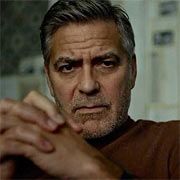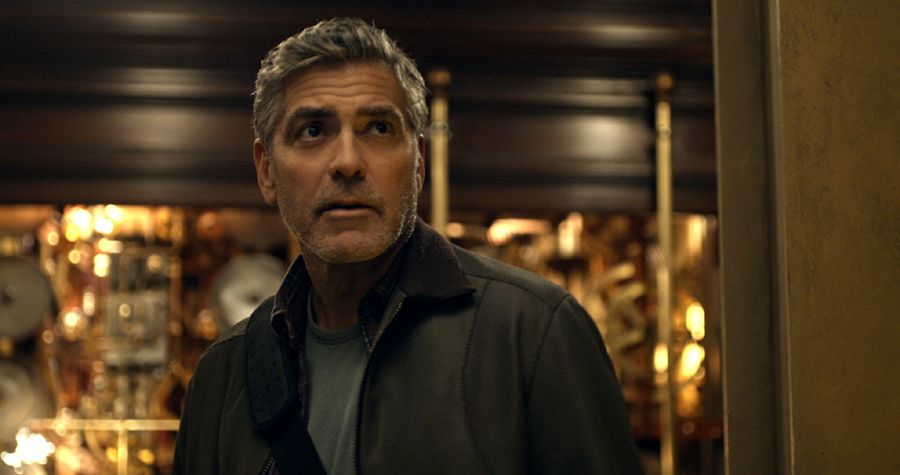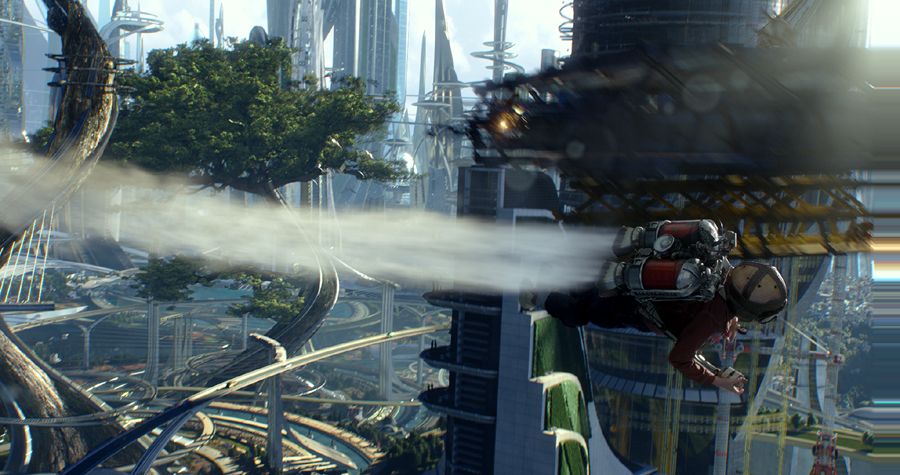There's Tomorrowland, the 60-year-old section of Disneyland envisioned by Walt Disney and still dedicated to a there of futuristic adventure. And there's "Tomorrowland," the big-budget Disney summer movie starring George Clooney that hints at a wondrous high-tech realm slightly beyond the reach of everyday humans. And somewhere in between is Tomorrowland as a state of mind, an optimistic, futurist vision for a progressive, pioneering world of discovery.
The creators and cast of the new film -- including director/co-screenwriter Brad Bird, co-screenwriter Damon Lindelof, stars George Clooney and Britt Robertson, and writer Jeff Jensen -- spoke with the press and dug into the motivations and inspirations that led them to try to capture the hopeful vision of a united, utopian future that Walt himself so fervently championed.
RELATED: Damon Lindelof Talks Merging Original Ideas with the ‘Tomorrowland’ Brand
Damon Lindeloff: I've always been really interested in the future, and I kind of feel like all of the movies that I've been exposed to over the course of the last 20 to 30 years has shown me a future that I don't really want to be living in. It's cool to watch: teenagers trying to kill other teenagers, robots eradicating mankind or just, you know, apocalyptic wastelands all being populated by Charlize Theron are all great. But what about that other future? And is there a way to tell that story?
Brad Bird: I was inspired by the idea, and I was an admirer of Damon's work. He did a little uncredited work at the very end of "Mission [Impossible: Ghost Patrol"], and it was a very tight series of things. You had to be very surgical and Damon was really smart, so I asked what he was doing next during that time, and he mentioned this idea and I was immediately hooked.
George Clooney: What I loved about the film was that it reminds you that, you know, young people don't wake up, they're not born and start out their lives cynical, or angry, or bigoted. You have to be taught all of those things. And I watch the world now and think I see really good signs from young people out there I feel as if the world will get better. I've always been an optimist. I've been a realist, but I've been an optimist about it. And I really related to the film because I thought, "You know, Brad and Damon want to tell a story that's an entertainment, because first and foremost, it has to be an entertainment. But it is hopeful."
Bird: I grew up and remember the moon landing. I remember how that felt. I was actually in the air when they were about to get out on the surface. We were flying in from Denver, and I was like, "I'm going to miss it!" Fortunately, there were some kinds of technical errors and we landed in the airport. We ran to the nearest TV monitor and there were, like, 400 people just packed in, watching when Neil Armstrong set foot on the moon. And everybody just went, "Whoo!" That feeling has never left me.
Clooney: I actually grew up during the Cold War period, and I always found that although we always thought that the world would end in a nuclear holocaust at some point, everybody was pretty hopeful. There were an awful lot of things going on that you felt you could change. I grew up in an era where the voice, the power of the one, really did feel as if it mattered. You know, we had the riots that are reminiscent of the things we are looking at today, but we had the Civil Rights Movement and we had Vietnam and we had the Women's Rights Movements and all those things that you felt you could actually have some part of changing. And actually, if you look at the things that changed in the 1960s and early 1970s, individual voices did make a huge difference. It wasn't governments doing it, necessarily. I didn't ever have that great disappointment in mankind. I always felt like it was going to work out in the end. And I still feel that way.
Bird: When we were first planning the movie, Damon and I were at Disney, and the space shuttle took its last circle over LA. Everybody came out and watched it, and there was this weird feeling of pride mixed with great sadness, like, "We're not doing that anymore," and, "Why aren't we?" So a chance to shoot at NASA was fantastic, and to be on this launchpad where so many really noble journeys started. We got to watch a launch from the launchpad, which was one of the coolest moments on the film. So it was great to be at NASA, and if this, in any way, encourages NASA people to do more, then I think that would be a great thing.
Britt Robertson: I think NASA also sort of represents a very specific hope, and it sort of ties in with the movie in a sort of symbolic way. NASA represents this unknown, and the human race's being able to explore the universe and other things that are out there. And I think that's sort of in line with the movie, in terms of theme. We're talking about a movie that's saying, "We don't know what our future is. It's not determined for us, and maybe if we go out there and explore the world, maybe if NASA wants to go and see what else is out there, then maybe that will have some helpful part in making our future something to be excited about."
Lindelof: I was really interested in the history of Disney -- the Imagineers and the theme parks in particularly, as it related to World's Fairs. There is a much longer version of this movie -- not necessarily a better one -- that is much more explicit about Walt's involvement. It was very explicit about the idea that he was a member of Plus Ultra, and that Disneyland -- particularly Tomorrowland and Disneyland -- were covers for the actual Tomorrowland. Our feeling was that, aside from trying to find that line in any movie when it gets bogged down by exposition and no longer becomes enjoyable to watch, the feeling was that by directly referencing Disney and Disneyland in a movie that is a Disney movie, it just suddenly felt like, "Oh, are we trying to sell tickets to go to the theme park," when the theme park should be selling tickets to go and see "Tomorrowland."
Jeff Jensen [story]: A lot of Disney really inspired and informed the movie -- especially, I think, EPCOT, the whole idea and original idea behind EPCOT and how that evolved as a sort of laboratory for the future. That was a huge inspiration for the story… The whole idea of a movie that kind of riffed on and looked at the different ways that we looked at the future then and now, to research the history of futurism and science fiction, and let that inform a story -- that was super-fun, and to really kind of build out the story.
Lindelof: Some of the very last things that Walt Disney filmed were about this experimental prototype community of tomorrow. He thought he was healthy, and within days he went into the doctor and learned that he had terminal lung cancer. But one of the last things he shot, he called it "Our Florida Project" and he was talking about [Disneyworld], and he said, "Yeah, there will be an amusement park kind of like Disneyland, but the whole reason to do it, the main attraction, is this!" And he pointed to the city and said, "It's going to be an actual place that you can try ideas and we'll take corporations and we'll collaborate with them on new ideas, and sell the ideas to the world, and try them out." And his face lit up when he talked about it… He was, to his last moments, dreaming about this future and making crazy ideas happen and be real and accelerate the pace of that. That was very moving to me, and if the movie caught even a little bit of that, I think we will have succeeded.
Clooney: Putting me in a summer movie is a very bold thought. [Laughs] First and foremost, I think it is a really bold thing for Disney to be willing to do a film that isn't a sequel and isn't a comic book, to really invest in a summer film of this sort of ilk. The fun part of it, to me, was when you read the screenplay. Although I have to say, just so we're clear, when Damon and Brad showed up at my house, they said, "We've got a part that we've written for you." And then I opened up the description of the character and it's a 55-year-old has-been, and I'm kind of going, "Hang on a minute! Which part am I reading for?"
Lindelof: It said "genius," by the way.
Clooney: It said "former genius" -- "boy genius who has gotten bitter in his old age." I just loved the idea of how we live in a world right now where you turn on your television set, and it's rough out there, and it's not fun, and it can really wear on you after a period of time. And we see generations now feeling as if it's sort of hopeless, in a way. And what I love about it is, it sort of speaks to the idea that your future is not preordained and predestined, and that if you're involved, a single voice can make a difference. I believe in that. I happen to believe in it, and so I loved the theme or the idea that there's still so much that we can all do to make things better.



